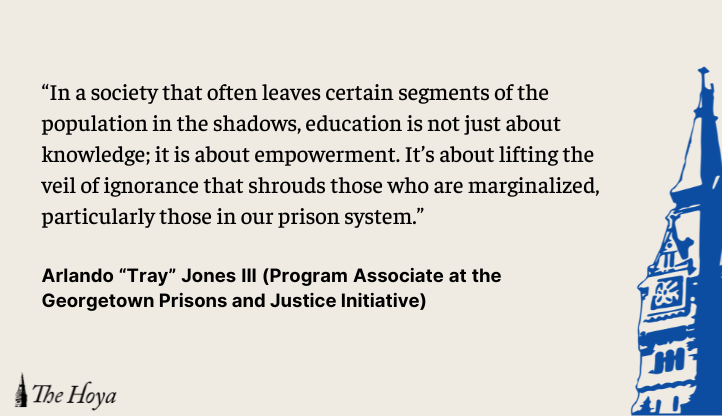When most university students think about their graduation, they picture a college lawn packed with friends and family, their caps aloft high in the air. And accompanying that is the expected movement away from campus into the next stage of their lives.
When I earned my degree, I did indeed have the cap and gown, but the only place I had to go after the small ceremony was back to my prison cell.
There are so many people like me whose first real shot at a college education came too late — after we were already trapped in the system of mass incarceration.
In a society that often leaves certain segments of the population in the shadows, education is not just about knowledge; it is about empowerment. It’s about lifting the veil of ignorance that shrouds those who are marginalized, particularly those in our prison system.
As penologists have suggested, the prison system depends on the docility of incarcerated people, and part of the way the criminal legal system maintains this docility is by withholding knowledge. Education, therefore, is not merely the distribution of information, but is a means of liberation from ignorance, and it is within our oppressive societies that the urgency for such liberation is most evident.
Charles Dickens, after his visit to Eastern State Penitentiary in 1842, astutely noted,“I hold this slow and daily tampering with the mysteries of the brain to be immeasurably worse than any torture of the body.”
The scars of ignorance, though not visible, are insidious and debilitating.
The American criminal justice system, responsible for immense suffering within specific segments of society, now necessitates the intervention of education.
I was 16 years old when I went to prison. My father had been killed by the police soon after my birth, and my mother’s battles with alcoholism kept her from being present in my life. I believed in God, but I had no reason to believe that God believed in me. I felt powerless and disposable.
Thirty-seven years would pass before I was finally free. And during that time, I discovered the accuracy of John Locke’s observation: “The only defense against the world is a thorough knowledge of it.”
While incarcerated I found ways to pursue my education, earning my General Educational Development degree and then a bachelor’s degree.
I also saw how prison education programs evaporated in the late 1990s after access to Federal Pell Grants was stripped from incarcerated people. Now, with access to Pell Grants restored, education in prison is expanding across the country.
It’s up to college and universities, correctional systems and governments at all levels to invest in the education of incarcerated people.
It was in prison when I first became a Georgetown University student. I took classes with Professor Marc Howard, the founding director of Georgetown’s Prisons and Justice Initiative (PJI), who became my friend and advocate before he became my colleague after I was freed in 2022.
Indeed, Georgetown has been a leader in bringing a transformative liberal arts education to incarcerated people. Now, as a program associate at PJI, I have a chance to reach back in support of others who are incarcerated or navigating their reentry back into society.
And for people who have experienced incarceration, education is the key to regaining some power over your circumstances. Educators do more than just teach; they create an environment where learning is an enjoyable and empowering experience.
By design, a structured curriculum is a potent weapon against ignorance, which is a malevolent force that perpetuates injustice in society.
In conclusion, education is not merely a privilege but a fundamental human right.
To deny it to any individual is to perpetuate ignorance and, consequently, the cycle of oppression. By introducing education into the lives of the incarcerated, we not only offer them a chance at redemption and personal growth, but also the opportunity to pave the way for a more just and enlightened society. It is a path that can lead to positive transformations within our criminal justice system, where the focus shifts from punishment to rehabilitation and where the power of knowledge is harnessed to empower all who seek it.
Georgetown is at the forefront of this fight, and I encourage the entire Georgetown community to confront it head-on. Learn more about PJI, GU Prison Outreach or the many other organizations in the D.C. area who are serving people affected by mass incarceration.
As Hoyas strive for the future they aspire for with their Georgetown education, I hope they find ways to support their incarcerated peers looking to do the same.
Arlando “Tray” Jones III is a Program Associate at the Georgetown Prisons and Justice Initiative.














